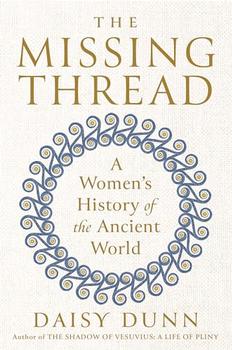Summary | Excerpt | Reviews | Beyond the Book | Readalikes | Genres & Themes | Author Bio

A Women's History of the Ancient World
by Daisy DunnExcerpt
The Missing Thread
Women were invented to make men's lives more difficult. Many men had always known this, but even so, it was comforting to hear it said by someone who had met the Muses, who knew the gods, who knew everything. Hesiod worked as a farmer in Boeotia, central Greece, and the Muses haunted Mount Helicon nearby. They met, in whatever way mortals usually meet divinities, and Hesiod came away a poet words as golden as the grain he sowed and as sharp as the scythe that cut it.
'Let no woman deceive your mind shapely bottom / And wheedling conversation,' he urged, 'it's barn she is seeking.' Women were good for ploughing with the oxen, bearing children, and scoffing the food they were supposed to store away. For everything else they were worse than hopeless. This was not entirely their fault, poor dears, but they paid the price for their descent from what Hesiod described in Greek as kalon kakon – a beautiful evil.
The beautiful evil, Pandora, was the first woman. Zeus, king of the gods, summoned the divine craftsman Hephaestus to sculpt her out of earth and water and give her the face of a goddess. Athena taught her to weave and dressed her in silver-white clothes and a finely wrought veil. The Seasons crowned her with flowers and the Graces placed gold around her neck. Aphrodite imbued her with sexual desire and Hermes gave her the mind of a treacherous dog. Each of the immortals had something to bestow – Pandora was 'all-gifted' and 'all-giving' – but she was above all Zeus' creation.
Pandora was intended as a punishment for men, the unfortunate pawns in an argument between the king of the gods and a Titan. Zeus was offended because Prometheus had tricked him by serving him a dinner of bones wrapped in fat instead of the finest cut of meat. In the heat of their dispute, gigantic Prometheus stole fire from the gods and gave it to humans so that they could fend for themselves. Prometheus' act triggered the end of the Golden Age, an Edenic era in which men (there were only men) lived off the land without work or disease or the need or even desire to travel overseas. With fire they acquired the means to build ships and cook and live faithlessly. And then Zeus sent Pandora down to earth. All man's troubles originated in her and the jar she carried with her.
There were variations on the myth (sometimes Prometheus rather than the gods was the sculptor and animator of the clay that created man), but the fundamental idea established by Hesiod in the seventh century BC persisted. Woman was a figment of the male imagination, formed between his fingers as a scapegoat for his woes. She could come in many forms: a poet named Semonides of Amorgos working in same period as Hesiod described pig-like women who cleaned neither their houses nor their bodies but spent all day fattening themselves; fox-like women, who noticed everything; donkey-like women, sex with everyone; disobedient dog-women; tempestuous sea-women; gluttonous earthwomen; thieving weasel-women; idle horse-women; ugly ape-women; and bee-women, industrious and brilliant, only good kind in existence. Pandora, like her Christian counterpart Eve, lingered in men's minds as the raw essence of femininity. wove as she wove, deceived as she deceived and, if they seemed lascivious, which any who enjoyed themselves in the bedroom loved as she had loved.
It was only in Byzantine period that more enlightened writers began to realise Pandora was more than a hideous objet d'art. She represented was possible after Prometheus cleverly hid fire in the stem of a fennel plant and gave it to mortals to play with. She was creative potential, art object and allegory of art rolled into one.
The transformation of Pandora began long before men were even aware of it. All through antiquity women were engaged in acts of making, writing, politicking and engineering that passed many men by. Male writers were quite happy to imagine mythological women turning their daily chores into creative exercises in self-expression. In Homer's Odyssey, which dates to just before Hesiod, Penelope cleverly unpicks by night the threads of a shroud she has been weaving by day to avoid marrying a grasping suitor. In Ovid's Metamorphoses, Philomela weaves the story of her rape into a tapestry after her tongue is cut out and she is deprived of the power of speech. It did not always occur to men that real women might be up to something just as interesting. These women are the focus of this book.
Excerpted from The Missing Thread by Daisy Dunn. Copyright © 2024 by Daisy Dunn. Excerpted by permission of Penguin Books. All rights reserved. No part of this excerpt may be reproduced or reprinted without permission in writing from the publisher.




I am what the librarians have made me with a little assistance from a professor of Greek and a few poets
Click Here to find out who said this, as well as discovering other famous literary quotes!
Your guide toexceptional books
BookBrowse seeks out and recommends the best in contemporary fiction and nonfiction—books that not only engage and entertain but also deepen our understanding of ourselves and the world around us.